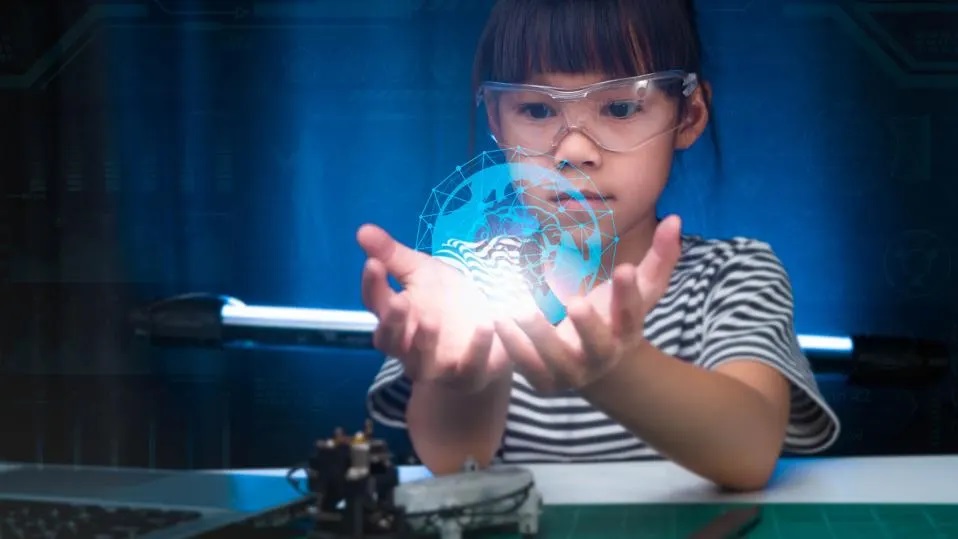As we venture further into the 21st century, the integration of Artificial Intelligence (AI) in education is emerging as a transformative force. The advancements in AI are not just fleeting trends; they are setting new foundations for the future of learning and teaching. Here, we explore the key AI trends reshaping education in 2024 and beyond.
Personalized Learning Paths
One of the most groundbreaking applications of AI in education is the creation of personalized learning paths. AI algorithms can analyze students’ learning patterns and adapt content delivery to their individual needs. This ensures that each student progresses at their own pace, fostering a deeper understanding of the material. This shift from a one-size-fits-all approach to customized learning journeys is a significant step towards more effective education .

Intelligent Tutoring Systems
AI-powered intelligent tutoring systems provide 24/7 learning companions for students. These virtual tutors use natural language processing to understand students’ queries and offer personalized guidance. This not only enhances the learning process but also extends support beyond traditional classroom hours, making education more accessible and flexible.

Enhanced Classroom Efficiency
AI acts as a valuable assistant to teachers by helping identify areas where students may struggle and providing resources for reinforcement. This allows educators to focus on inspiring and guiding students rather than getting bogged down by administrative tasks. AI’s role in boosting classroom efficiency enables a more dynamic and engaging learning environment.

Gamification of Learning
Incorporating elements of gamification into education has proven to be an effective strategy for boosting student engagement and motivation. AI can design interactive and immersive learning experiences, turning lessons into engaging games. This approach not only captivates students’ attention but also reinforces key concepts in a fun and memorable way.

Smart Content Creation
AI is revolutionizing the way educators create content. With tools powered by natural language processing and machine learning, AI assists in generating comprehensive, up-to-date educational materials that align with curriculum standards. This ensures that teaching resources are not only relevant but also enhance the overall learning experience.

Data-Driven Insights
The vast amounts of data generated by AI in education provide valuable insights into student performance and learning trends. Schools and educators can use these data-driven insights to refine teaching methods, identify areas for improvement, and enhance the overall quality of education. This data-centric approach allows for more informed decision-making in educational strategies.

Accessibility for All
AI plays a pivotal role in making education accessible to diverse learners, including those with disabilities. Adaptive technologies powered by AI tailor resources to accommodate various learning styles, ensuring that every student, regardless of their abilities, has an equal opportunity to excel. This inclusivity is crucial for fostering a more equitable education system.

Virtual Classrooms
AI-driven virtual classrooms have transcended physical boundaries, allowing students to connect with peers and educators globally. This fosters a collaborative learning environment that prepares students for the interconnected world they will navigate in the future. The ability to participate in global learning experiences is a significant advantage in today’s digital age.

Automated Administrative Tasks
AI streamlines routine administrative tasks such as grading and attendance tracking, freeing up educators to invest more time in direct interactions with students. This automation not only improves efficiency but also enhances the focus on teaching and learning.

Continuous Learning
In the era of AI, learning extends beyond formal education. AI-driven platforms offer continuous learning opportunities tailored to individual career paths, ensuring that learners remain relevant in a rapidly evolving job market. This lifelong learning approach is essential for adapting to the demands of the future workforce.

Conclusion
The integration of AI in education marks a paradigm shift in how we approach learning. From personalized learning paths to global connectivity, AI is a powerful ally in shaping the future of education. These advancements are not just about adapting to change but actively participating in the evolution of a more inclusive, efficient, and engaging educational landscape. As we embrace these AI-driven innovations, the possibilities for enhancing education are limitless.
At Edunetix, our mission is to harness the power of AI to transform education and empower learners. We provide personalized education pathways and expert AI consulting to help individuals and organizations achieve their goals. By integrating cutting-edge AI technologies, we aim to make learning more accessible, engaging, and effective. Our commitment to innovation and excellence drives us to continuously explore new ways to enhance education through AI.
Call to Action:
- Are you interested in partnering or piloting our technology? Contact us at info@edunetix.co
- Want to learn more about our initiatives for diversity and inclusion? Visit our website at www.edunetix.co
- Share this blog post to help spread the message of building a more inclusive future of work!
For further reading on the subject, please refer to the sources:
- IEEE GUC. “The AI Revolution in Education: A Game-Changer for Learning.” IEEE GUC
- IEEE Transmitter. “AI 2024 – IEEE Transmitter.” IEEE Transmitter
- HeySIA. “AI Trends in Education 2024: Shaping Future Learning Dynamics.” HeySIA
- IEEE Xplore. “Enhancing Educational Interactions: A Comprehensive Review of AI.” IEEE Xplore




